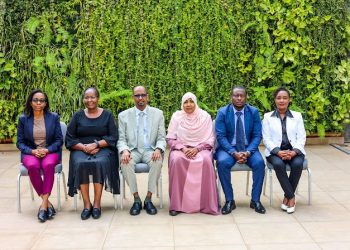By Samwel Doe Ouma@samweldoe
The COVID-19 pandemic and the growing burden of communicable and non-communicable diseases worldwide have pushed governments and stakeholders to explore new ways of improving access to healthcare and creating more resilient health systems.
According to the 2021 Access to Medicine Index; Partnerships with pharmaceutical companies are contributing to access to health products and their availability, especially in middle and low-income countries (LMICs), with the recent Access to Medicine Index results recognizing the role played by 18 out of 20 pharmaceutical companies in strengthening health systems by working with national or regional health authorities and governments to integrate various programs into health services in LMICs.
The report says, “Companies such as AstraZeneca, GSK, Johnson & Johnson, Novo Nordisk, Sanofi and Takeda have received acknowledgement for having initiatives that meet all Good Practice Standards as set by the Access to Medicine Foundation.”
Public-private partnerships (PPPs) have strengthened their position as one of the solutions to removing barriers and creating affordable and sustainable healthcare solutions.
AstraZeneca has for example, received recognition for its multi-country initiatives, the Young Health Programme (YHP) and the Healthy Heart Africa programme (HHA), which were outstanding and ranked as a best practice in helping to equip health systems for the fight against non-communicable diseases (NCDs).
According to the World Health Organization (WHO), NCDs are steadily increasing in prevalence in the African region, and they are predicted to overtake communicable diseases by the year 2030. Over time, they have grown to become the leading cause of death worldwide and sharpened the focus on the growing need to achieve Universal Health Coverage (UHC).
During the ongoing pandemic, NCDs and their risk factors are aggravating the susceptibility to COVID-19 infection and increasing the likelihood of worse outcomes for patients.
In Africa, PPPs are contributing to the achievement of the Sustainable Development Goals (SDGs) and the attainment of UHC. In East and West Africa, AstraZeneca’s Healthy Heart Africa programme is addressing hypertension and the increasing burden of cardiovascular disease (CVD).
The programme, which is currently active in Kenya, Ethiopia, Uganda, Tanzania and Ghana, is working with local governments and partners to increase access to hypertension services. Working with local partners, the HHA programme is strengthening health systems by integrating blood pressure screening and hypertension treatment into routine care.
“Healthy Heart Africa contributes to sustainable healthcare in Africa through education and by raising awareness of cardiovascular diseases, specifically hypertension. Its late detection, as with other NCDs, puts pressure on health systems and results in high costs of treatments, which have both resulted in devastating social-economic impacts on individuals.
The programme works with local health systems to improve capacity by training healthcare workers, ensuring that there are treatment guidelines in place and providing basic equipment that healthcare providers need to detect elevated blood pressure.
HHA also contributes to data collection mechanisms that can help inform decisions in policy making and their implementation. At the moment, lack of data is one of the major challenges facing access to hypertension care in Africa,” said Dr Allan Mackenzie, Associate Director, Global Sustainability – Access to Healthcare, Government Affairs, at AstraZeneca.
Disease prevention is another key pillar in efforts to build sustainable health systems. Emerging strategy focused on youth, as two thirds of early deaths registered in adults have been associated with NCD risk behaviors that first appear in adolescence.
The Young Health Programme (YHP) is an NCD prevention initiative for young people aged 10 to 24 in Africa and other parts of the world. The partnership programme focuses on under-resourced areas of the world by providing education, advocacy, research and mentorship to this age group, positioning them to make empowered decisions about their health. During the pandemic, the programme is teaching youth on how to maintain healthy lifestyle choices even while observing recommended safety measures.
“Today, young people make up 16 percent of the world’s population. And in Africa, youth age 25 and under make up 60 percent of the population. We are faced with a great opportunity to create awareness about NCD risk factors and empower young people to make healthy choices now, so as to avoid poorer health in the future. They are change agents who can be strong advocates of development issues and policies made towards healthcare.”
The YHP works with youth in Kenya, Egypt and most recently Angola and South Africa, to improve health outcomes among young people. With our partners, we aim to train 1,000 young advocates and reach more than five million young people with NCD prevention messages by 2025,” said Armpit Bansal, Country Director – Sub-Saharan Africa, at AstraZeneca.
Commenting on the programme in Kenya, Kate Maina-Vorley, Country Director at Plan International in Kenya, said, “The YHP in Kenya is delivered in the informal settlements of Kibera and Mathare and has directly reached more than 82,000 youth since its launch in 2016. We work closely with AstraZeneca and the Government of Kenya to ensure that young people are provided with youth friendly services.
In Kibera, we have partnered with 12 health facilities to provide services such as screening and provision of information on NCDs. Bearing in mind the importance of functional and inclusive policies, we have worked with the Nairobi County government to support policies on NCDs and ensure that they include youth in development and implementation.
‘We have also worked with the national government to review the national school health policy and guidelines to include NCD prevention strategies for young people in schools. I am also glad to note that in January 2021, the YHP expanded its reach in Kibera as well as Mathare informal settlement for the next five years.”
According to an independent external evaluation of the first 5 years of the YHP Kenya programme conducted by Spectrum African Research and Development Institute, there has been positive and sustained behavior change among youth who are beneficiaries of the programme. For instance, the number of youth using tobacco dropped from 47 percent at baseline to six percent at the final evaluation. There has also been an improvement in young people’s satisfaction with access to and the quality of healthcare services from 18 to 71 percent within the first five-year period.
In South Africa, the Phakamisa programme is taking a collaborative approach between community, civil society, government and private entities to improve breast and prostate cancer management in the public sector. Phakamisa which means ‘uplift’ in Zulu addresses early detection of the diseases while promoting primary prevention and access to care,” said Ruth Field, Market Access Director at AstraZeneca in South Africa.
Ruth added, “Phakamisa has, over the past 10 years, contributed to reducing the cancer burden which has been a growing problem in South Africa. According to the cancer registry, breast cancer is the most common cancer in women while prostate cancer is the most common cancer among men.”
Lack of awareness often leads to delayed treatment for symptoms, especially among low income and marginalized communities and this has hindered efforts to combat the disease. Through community health workers, the programme has reached over 1.63 million people and identified over 19,700 women with breast issues















